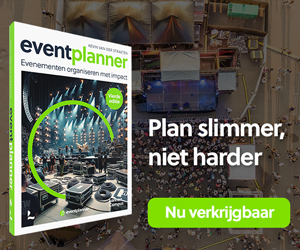Transcript
What happens if we look at meetings through the lens of history? I'll ask FRESH keynote speaker George Parker.
Hi George, welcome to our studio.
Thanks for having me, Kevin.
George, you're one of the keynote speakers at the FRESH conference in Turnhout this year.
Maarten, the organizer, was here a few weeks ago. And he told us already, that you are talking about how meetings changed over the last few decades.
Actually: centuries, millennia.
Oh, okay.
Yes, I will be going back, to inspire people. Go back to the core of meetings. Why do people meet at all? What's the core of that?
And, as a magician, not as just a theatre performance magician. But also, the history of magic goes back to transformational rituals.
So, people gathered to, as Maarten mentions in his book, learn, become a better version of themselves, charge their battery and interact, which was a huge part of any ritual.
So, I tend to go back to describe it.
Obviously, I'll illustrate that by doing some illusions, acting, comedy. Mixing art, content, science to get somewhere.
So, for example, if you see this, and you want to refresh this, and reset it, pun intended, then you'll need to transform it. And any meeting was meant to transform people into better versions of themselves. To charge that battery. To learn a little bit. And once you do that, you'll see that you'll end up with a better form of reality. That isn't just a sketch.
That's great.
If we go back just a second. To the history of meetings. I think especially the last few decades, that's why I was saying the last few decades earlier before, especially technology is changing a lot of the stuff we do.
Absolutely. That's why I tend to go back to that core of why we are meeting. In order to reset it and... Because we usually, what we do, is repeat our past. What we do is repeat our breakfast from yesterday. Or the way we have meetings. The way we organize organizations, for example.
But the reason why we do it, hasn't changed. Just the form and design in which we execute those meetings. That vastly expanded. So, we have lots more possibilities.
By going back to the core, I hope to inspire people to, kind of, renew their ideas about what meetings are and what needs are.
So, yes, technology has, I think, added a lot to that. Like, were meeting right now and I've done lectures behind my desk.
Secondly, the diversity, the types of meetings have changed. So, that primal meeting, coming together, around the fire, dancing...
The food was always involved. Or substances that change your level of consciousness. All those things are still involved in meetings. People have drinks, people eat. People meet, people dance, people actually go through a meeting, coming out of that meeting. And I do think that the variety has changed a lot. So, there's still meetings that are really formal. And there are meetings like Trance Dance festivals, for example. And I do think that festival is one of the hot topics in the FRESH meeting.
Yes, it is, it is. In your intro, on the website of FRESH, I also read that you integrate science into your performances, I should call them. What's that about?
Well, there's always...
In science, you can always measure things. But science, sometimes, is limited to just numbers. The science behind meetings is about the psychology, the biology and also the physics of human behaviour.
So, once you go back to that old ritual, it provides you with a metaphor, how things went, back in that day. Same ingredients: learning, charging the battery, networking, all included. You can see the expansion of forms. And now we have the possibility to know why that was so important.
So, for example, when you go to brain neurology, for example, we can see why we need those rituals, for example. Because we get stuck in our own ways of thinking. Neural pathways, for example. That wasn't known a hundred years ago. We know that now. So, we can better...
We have better ways and better knowledge to redesign it. Also, trust in science, as part of like why we do it. And why people need that reset-moment.
Otherwise, like I sometimes say, your wedding day will turn out to be the best day of your life. After that, things kind of went down. So, that was the great ritual. A meeting, of sorts. And you need to do that over and over again.
So, meetings, I think, are incredibly important for people to get together, charge their battery, learn and to reset their lives.
But it's also important for the meeting industry itself, to reset and, kind of, look at, with new eyes, at what meetings are and how they can redesign it, in a way to accommodate their clients.
And, from your experience, with the science, with looking back to history, how should we, as an industry, rethink those meetings? What exactly should change?
Well, that may be a meta-answer, but you might need a really good meeting yourself, as in a transformational meeting, in which you can get outside of your box.
Because that was the intention of any meeting. And younger people especially. I worked with twelve-year-olds and sixteen-year-olds and twenty-five-year-olds and they go to a meeting, wanting to interact, wanting something to happen to them. They want to get out. They want to, sure, have a fun time. But not everything needs to be highly produced and everything doesn't need to be predictable.
There doesn't need to be like a book with: what happens when? They just want to surrender to something, do some trance dancing and let the coincidence, for example, play a role. Or meeting other people. Or going away richer than they came.
So, the meeting industry might need a, kind of like, reset, or out-of-the-box type of meeting. In order to, kind of, break loose from the orthodox formats and to, at least, give some room to new ideas.
Okay, people who want to learn more about this subject: you're speaking at FRESH on October 13th.
Yes, evening.
People can find more information the event on thefreshconference.com. We will put the link below the video.
So, George, thank you very much for your time. And sharing already some insights in what you will be talking about.
Yes, my pleasure and I do hope people will come to, kind of, get refreshed. Because, there's, a couple of days after what I've done on Sunday night. So, they can take away. I'll be framing it.
So, in order for people to use the conference itself. To refresh their ideas and to, kind of, reset and then move forward from that.
So, I hope to achieve that and usually I do. So, I'm looking forward to it. Very much.
Okay, thank you very much.
Bye.
And you at home, thank you for watching our show. I hope to see you next week.







